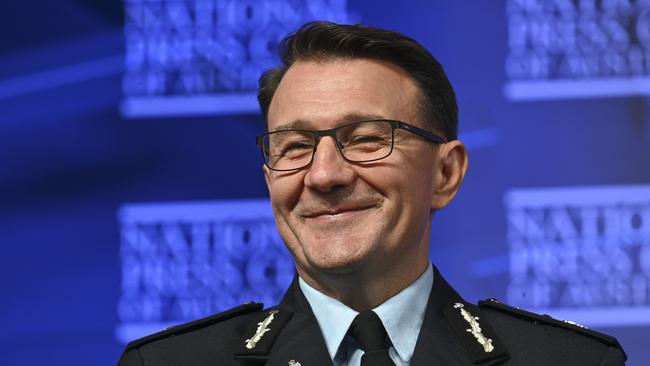Australian Federal Police boss Reece Kershaw warns of a “threat to democracy” as MPs face greater risks
AFP Commissioner, Reece Kershaw, has revealed there were 725 threats against MPs reported so far this financial year - compared with only 279 in 2020-21.

Australian Federal Police Commissioner, Reece Kershaw, has warned there is a rising number of threats against parliamentarians with 725 reported so far this financial year compared with only 279 in 2020-2021.
“In the past four years, reports of harassment, nuisance, offensive and threatening communications against Australian parliamentarians has increased by 160 per cent,” Mr Kershaw told a Senate estimates hearing. “In 2020-21, there were 279 reports. So far this financial year, there have been 725 reports.”
Mr Kershaw said he was “concerned about this trend.”
He said that more activities and events in 2023 attracted a “heightened level of security risk”, requiring the “implementation of additional resources and risk treatments.”
“As of March 31, we recorded a 35 per cent increase year-on-year from 2023 relating to parliamentarians’ movements assessed as a significant risk or higher,” he said.
Mr Kershaw said that threats against parliamentarians were “a threat to democracy” and the AFP was “starting to plan our response given a federal election will be held within a year.”
He said the AFP’s role was to “ensure the safety and dignity of our parliamentarians.”
“We never take it for granted, but it is testament to our CPP – our Close Personal Protection officers - and the teams that support them, that we have not had an incident where we have had to save a politician from serious harm or death,” he said.
Mr Kershaw warned the AFP faced a number of threats with the “potential to impact on our social cohesion, the safety of our youth and our democracy.” He revealed that, since July 2021, the AFP, alongside its joint counter terrorism team partners, had initiated investigations and operational activity in relation to 27 youths who were 17-years-old or younger (with the youngest being 12-years-old).
He said that, of those youths, more than 60 per cent had been charged with commonwealth or state-based offences including “advocating terrorism; possess/distribute extremist material; acts in preparation for a terrorist offence; membership of a terrorist organisation; drug-related offences; firearms offences; possession of child abuse material; and possess, supply or making of explosives.”
He said the AFP’s caseload reflected a “highly-concerning trend of youth being radicalised online by other individuals they are engaging with, or through self-radicalisation.”
“We are concerned about the activity identified online, as well as what is happening in the real-world, including violence in schools, such as planning possible attacks on students and teachers, and the production of explosives or possession or use of weapons,” Mr Kershaw said.
He said the AFP prioritised early intervention and disruption strategies ahead of prosecuting young people. Mr Kershaw noted it took “significant resources” to manage high risk terrorism offenders once they were released back into the community after a term of imprisonment.
“The management of each offender requires dedicated resources, with planning typically starting two years before their release date,” he said. “For example, the AFP managed and enforced extended supervision order conditions on an adult between 26 August, 2022, to 21 January 2024. This required about 80 members, and 10,300 operational hours.”
He said there were currently 25 high risk terrorism offenders due for release within the next five years.
Mr Kershaw also warned that online radicalisation of young people was a key issue, declaring that parents needed to be “invested in their children’s online nutrition, because there is a lot of junk and rubbish on the internet and social media platforms.”
“What young people digest online can have a significant impact on their health, including their mental health,” he said. “This is where we need the community to understand the expanse of organised crime and the commodities they target.”
Mr Kershaw said that “sextortion organised crime gangs are pushing our youth to suicide for money, and in our region, organised criminals are responsible for crimes like human trafficking, such as sexual servitude.”
He said that drug traffickers, cyber criminals, human traffickers and sextortion gangs were “fraying Australia’s social fabric through the crimes they commit, and the direct and indirect impact of those crimes.”
Me Kershaw said that, since 2019, domestic drug seizures have prevented more than $45 billion in harm against the Australian public, including preventing 4 tonnes of methamphetamine coming into Australia in the past five years.



To join the conversation, please log in. Don't have an account? Register
Join the conversation, you are commenting as Logout